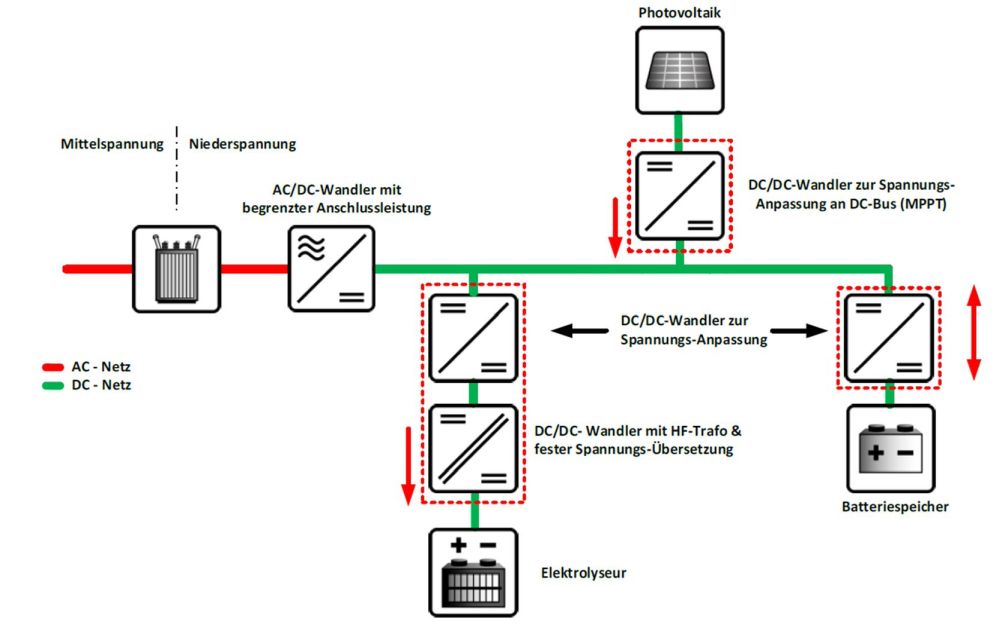| Duration: | 11/2022 - 10/2024 |
| Contracting Authority/Sponsors: |
Invest BW on behalf of the Ministerium für Wirtschaft, Arbeit und Tourismus Baden-Württemberg |
| Project Partners: | Handtmann e-solutions GmbH & Co. KG |
| Project Focus: |
mDC2H2
Development of a Modular Direct Current System for Decentralized Hydrogen Production from Renewable Energies

With the amendment to the Climate Protection Act, the German government has tightened climate protection targets and anchored the goal of greenhouse gas neutrality by 2045. Emissions are already to be reduced by 65 percent by 2030 compared with 1990. In June 2020, the German government adopted its national hydrogen strategy, according to which green hydrogen production plants with a total capacity of up to 5 GW are to be built in Germany by 2030. The economic production of hydrogen places various technical and economic demands on the electrolyzer of a power-to-gas plant. Within the scope of this project, an efficient modular DC system for the integration of PEM electrolysers will be developed in cooperation with the industrial partner Handtmann. Hydrogen generation from on-site renewables as well as from the grid will be possible via the highly efficient DC technology and evaluated with a technology demonstrator. The DC infrastructure allows the integration of different from PV systems, batteries and also the Ely as a hybrid storage system. An intelligent operation management system allows optimal tuning of local storage.
The system consists of modularly scalable power electronic converters, each with a rated power of 100 kW per unit. The innovation of the system architecture comes from the reduced system costs and the high efficiency of the hybrid PEM battery storage:
- Modular overall system with decoupling of the AC and DC sides (scalability of converter power via DC bus, adaptation to power class and part-load operation of power generators, minimization of grid interferences).
- Increase in power density and efficiency through use of new power semiconductors (SiC), higher switching frequencies and innovative technologies (soft-switching topologies)
- Lifetime increase of PEM electrolysis stacks (modularity in 100 kW units and high quality of power supply)
- Increase of payload hours of the electrolyzer by integration of further DC bus participants (e.g. regenerative DC industrial devices) or absorption of overcapacities from the grid possible
- Integration of converters into existing DC infrastructure possible (PV, e-mobility, battery storage, industrial grids)
- DC bus management and higher-level operation management with intelligent energy management
DC-based energy systems have advantages for the integration of photovoltaic, battery and electrolyser systems, modular DC/DC converters, enable efficient decentralized hydrogen production. The experience gained from the project is important for research into DC grids, which are becoming increasingly widespread in industry, and important findings are also expected in the interaction of electrolyzers and batteries.
The research project "mDC2H2" is funded by Invest BW on behalf of the Ministry of Economics, Labor and Tourism Baden-Württemberg and accompanied by VDE/VDI/IT. Partners in the network are, in addition to the Fraunhofer Institute for Solar Energy Systems ISE, Handtmann e-solutions GmbH & Co. KG as project coordinator.